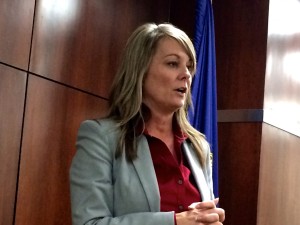
State superintendent Sherri Ybarra gave senators a glimpse of life with a new, rewritten waiver from the federal No Child Left Behind education law.
No references to Propositions 1, 2 and 3.
No five-star ratings.
No references to the Schoolnet instructional management system,
And, maybe, no ISAT by Smarter Balanced, the new Idaho standardized test aligned to Idaho Core Standards.
Ybarra discussed the rewrite with the Senate Education Committee Monday afternoon. The clock is ticking. The state’s current waiver from the unpopular and unsuccessful NCLB law expires in June. The new waiver application is due on March 31, although Ybarra’s team can continue to tweak it along the way.
“This is a real opportunity for us to make substantial changes,” Ybarra said.
Some of the changes will align with the changing political landscape. The references to Props 1, 2 and 3 will go by the wayside — reflecting the fact that voters rejected the three laws in November 2012, after the existing waiver was written.
Ybarra hopes to use the waiver as a chance to dump the state’s five-star school ratings, which have been on hold since 2013 anyway. Ybarra thinks the ratings and scoring system is too confusing for parents and taxpayers, and she would like to go with four ratings: below standards, meets standards, exceeds standards and exemplary.
The federal government wants states to offer some kind of school rating system, Ybarra said, and the feds have sounded open to the state’s idea. The new rating system would go into effect in 2016 — the second year of the ISAT by Smarter Balanced exams.
The new waiver would also delete references to specific vendors — including Schoolnet, former state superintendent Tom Luna’s preferred instructional management system. Schoolnet has received spotty reviews for years, and critics said the system has not delivered on its promise of helping teachers apply student data to tailor individualized learning plans.
The state’s Office of Performance Evaluations is scheduled to release a report on Schoolnet next week, and Ybarra interim chief deputy Pete Koehler says the findings will be extremely critical. Ybarra’s office wants to encourage the use of instructional management systems, without endorsing a specific approach.
The rewritten waiver would advocate a minimum of student testing — perhaps focusing on end-of-course exams, senior projects and the required college entrance exams as yardsticks to assess high school students. But under questioning from committee members, Ybarra said she would like to stay with Smarter Balanced version of the Idaho Standards Achievement Test — a Common Core-aligned exam that will launch this spring. The Senate has already passed a resolution that would require Ybarra to present alternatives to the exam in 2016.
Ybarra is withholding judgment until this spring’s tests.
“I would like to see how we do,” she said. “We are open to looking at other alternatives, and we have started to do that.”
Disclosure: Schoolnet was funded through a three-year, $21 million grant from the J.A. and Kathryn Albertson Foundation, which also funds Idaho Education News.
